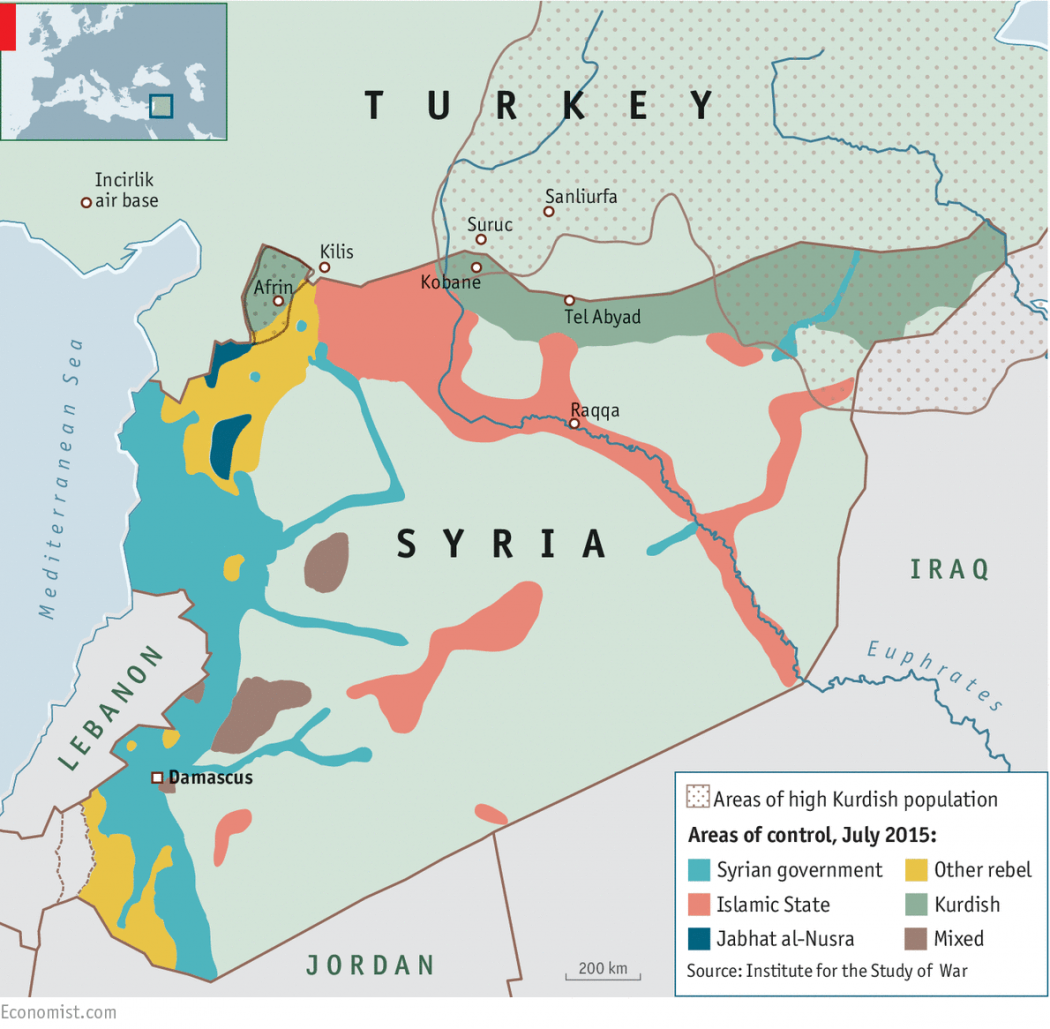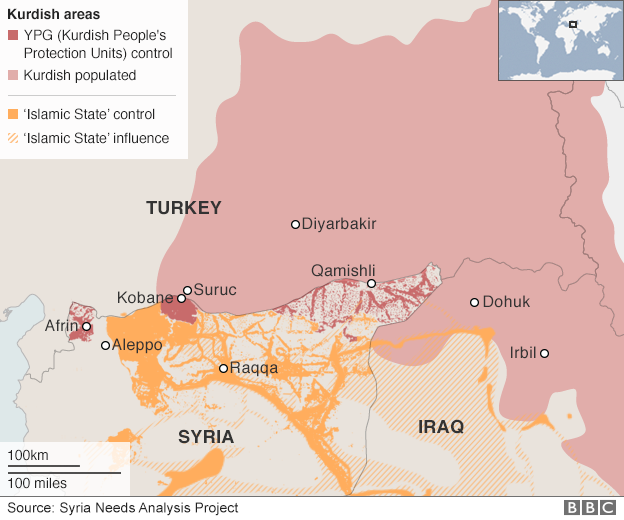In the last week we’ve seen three major developments in Turkey. The boarder country with Syria has been under increasing pressure to ramp up its efforts to fight off ISIS. The conflict for Turkey is that it’s not interested in aiding either the PKK, the Kurdish Marxist group or the Asad regime in Turkey. They’ve been staying out of the fight, much to the dismay of the US and others fighting ISIS for the last year. A suicide bomb attack in Turkey changed their minds and now it seems Turkey is on a rampage.
- They’ve broken their 3 year ceasefire with the PKK and over the weekend they’ve been bombing the PKK strongholds in Northern Iraq.
- They’ve started flying jets in Syrian airspace and attacking ISIS
- They’re allowing the US to use air bases to launch attacks on ISIS in Syria, a major shift from previous allowance which limited use to non-weaponized planes.
What does this all mean? The region is realizing that ISIS is a bigger threat than earlier anticipated, the smaller fractional non-governmental groups are getting pulled into the larger political landscape either being categorized as enemies or allies, there is no more neutral.
This will continue to heat up, we’ll keep you on top of the developments — SIGN UP FOR OUR NEWSLETTER TO GET THE DETAILS — Black box to your right — Sign Up!
This BBC Video is great if you only have time for a briefing:
The Iraq raids, which began late Friday and continued into Saturday, effectively ended an unstable two-year cease-fire between the Turkish government and the Kurdish militants, also known by the initials of their Kurdish name, P.K.K. After a three-decade conflict that claimed at least 40,000 lives, the two sides reached a fragile peace in 2013, though there have been a few minor clashes since then.
Fighter jets also struck Islamic State targets in Syria for a second day, Prime Minister Ahmet Davutoglu’s office said in the statement on Saturday. The jets entered Syrian airspace to do so, the statement said, unlike during the previous strikes, which the government said were carried out from the Turkish side of the border.
“No one should doubt our determination,” Mr. Davutoglu said, speaking to reporters in Ankara, the capital, on Saturday. “We will not allow Turkey to be turned into a lawless country.”
In the past week, Turkey began taking a more active role in fighting the Islamic State, also known as ISIS or ISIL, agreeing to let the United States use its air bases to attack the militants in Syria as well as carrying out its own strikes. The moves came after a suicide bomber suspected of having Islamic State ties struck a cultural center in the Turkish border town of Suruc on Monday, killing at least 32 people, in one of the worst cases of spillover violence from the war in Syria.
Turkey has been pressing the United States to establish a no-fly zone in northern Syria, and that goal seems to have gained traction with the Turks’ air campaign.
“Once ISIS has been cleared from the areas in northern Syria, ‘safe zones’ will be formed naturally,” offering havens for displaced people, Foreign Minister Mevlut Cavusoglu said on Saturday.
In a separate but parallel operation, Turkish authorities have carried out a series of counterterrorism raids over the past two days, arresting 590 people suspected of being members of the Islamic State or the P.K.K., Mr. Davutoglu said.
The Wall Street Journal explains the new military oppression in Turkey:
Turkey agreed to allow the U.S. to use air bases there to launch strikes against Islamic State forces in neighboring Syria, a major shift long sought by Washington and sealed hours before a deadly clash between Turkish forces and militants across the border.
Incirlik is a U.S. base about 60 miles from the Syrian border, giving U.S. jets and unmanned drones vastly improved logistics for daily attacks on the radical group compared with other sites across the region now in use. Military officials said the agreement also opens up other bases in Turkey for potential use in the campaign against Islamic State.
“This is a significant shift,” said a U.S. military official. “It’s a big deal.”
The decision to more closely ally with the U.S. also exposes Turkey to a heightened risk of attack by extremists. Thursday’s clash highlighted the dangers Islamic State, also known by the acronyms ISIS and ISIL, already poses to Turkey, which has long served as the primary lifeline connecting the group’s de facto capital in Syria with the outside world.
“This is a threat at their doorstep,” said a senior U.S. defense official. “In the end, it’s in their self-interest to let us use the base to strike ISIL.”
The broad outlines of the deal were settled in a phone call Wednesday night between President Barack Obama and Turkish President Recep Tayyip Erdogan, hours before Islamic State forces in Syria opened fire on a border outpost, killing one Turkish soldier and dragging the country even deeper into the chaotic regional conflict.
Turkey has long been accused of aiding Islamic State’s rise by allowing its fighters to freely cross its borders—something its leaders have vehemently denied. The country resisted American pressure to do more in the 60-member international coalition battling Islamic State ever since a bombing campaign started last year. Ankara’s hesitation was due partly to differences with Washington over strategy.
Until now, Turkey has only allowed the U.S. to fly unarmed surveillance drones out of Incirlik. But persistent American pressure, combined with increasing threats from Islamic State forces to turn their weapons on Turkey, finally convinced Turkish leaders to take more decisive steps to fight the militants, officials said.
“In the end, we too have become the target for the ISIS,” said a Turkish official at the Syrian border near Kilis—site of Thursday’s cross-border clash. “There’s a growing nervousness along the border.”
Here’s the Economist: AFTER a year of hesitation, Turkey has come off the fence and joined the American-led coalition’s military operations against the Islamic State (IS). On July 24th Turkish F-16s carried out airstrikes for the first time against IS jihadists inside Syria. The army said jets hit three targets in areas south of the border province of Kilis, where a Turkish soldier was killed on July 23rd by suspected IS militants firing from the Syrian side. Also on July 23rd, Turkey announced it will let coalition aircraft use the NATO airbase at Incirlik to hit IS targets. Turkey’s long refusal to do so had led to tensions between Turkey and America, and prompted accusations that Turkey’s Islamist government is colluding with the jihadists.
Western diplomats say Turkey had already agreed to let America use Incirlik for offensive operations before the blast. General John Allen, Barack Obama’s special envoy to the region, has been working on a deal for the best part of a year. But the Turks had resisted, demanding in exchange that America declare a no-fly zone over Syria, help establish a safe haven on the Syrian side of the border and give as much military priority to removing Bashar Assad from power as to combating IS. A safe haven would help prevent further refugees from coming to Turkey, already home to nearly two million Syrians displaced by the conflict.
Turkey also frets about blowback inside its borders, where IS is believed to have established a sizeable network and recruited hundreds of fighters. But Mr Obama fears a safe haven would lead to America having to commit ground forces. Western officials say their priority remains destroying IS, not toppling Mr Assad. So what prompted Turkey’s shift?
Many believe the move was made to salvage ties with America. Mr Obama has publicly rebuked Turkey for not doing enough to stop the flow of foreign fighters and weapons to Syria. But the immediate cause for the reversal appears to be Turkish fears that its reluctance was deepening America’s friendship with the Syrian Kurds. The People’s Defence Units (YPG), a Syrian Kurdish militia, has become America’s top partner against IS inside Syria. This worries Turkey because the YPG is closely linked to the Kurdistan Workers’ Party (PKK), the rebel group that has been fighting on and off for decades to establish Kurdish self-rule in Turkey. The YPG’s steady expansion along the border stokes Turkish fears of a new Kurdish entity that would be become a magnet for millions of Turkish Kurds who support the PKK.
Turkey’s change of mind will have a major impact on the intensity of the air campaign against IS. Incirlik is only a few minutes’ flying time from Syria, compared with the long haul to IS strongholds from bases in Jordan, Iraq, Kuwait and the Gulf. That means the sortie rate can rise: pilot fatigue will be lower, and fewer missions will require aerial refuelling. Its also means that strikes called in by surveillance drones will leave mobile targets much less time to disperse or hide.







